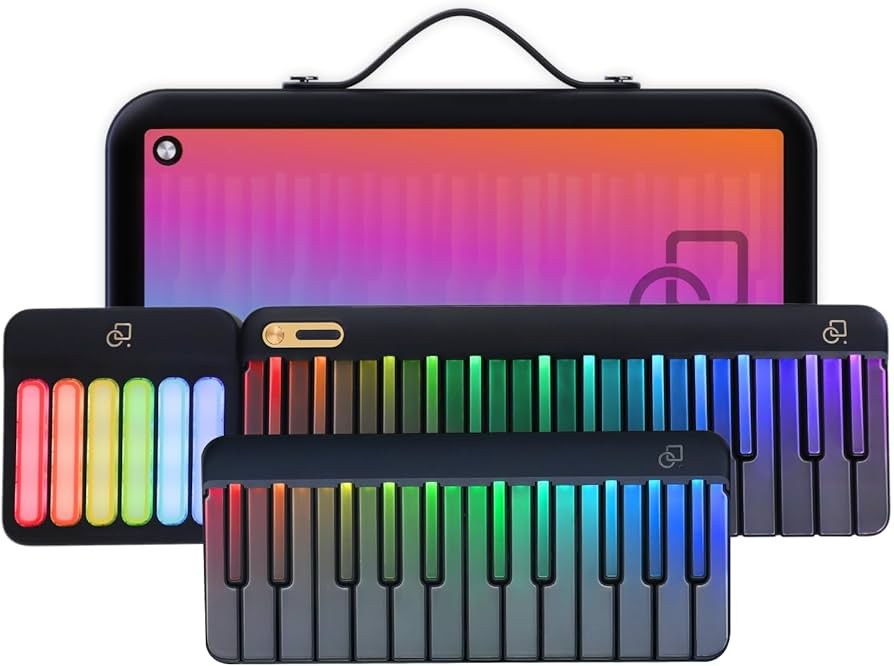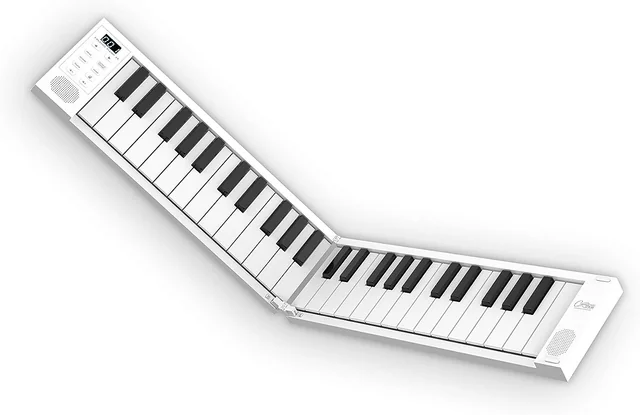
The freedom to play music anywhere — on the street, at the park, or during a road trip — is what makes battery powered keyboards a dream for modern musicians. Whether you’re a traveling artist, a casual busker, or a digital nomad who can’t leave music behind, portability and tone now go hand in hand.
In this complete 2025 guide, we’ll cover the best battery powered keyboard piano models for every kind of traveler, including compact smart keyboards, stage-ready instruments, and entry-level picks.
Smart Keyboard — a lightweight, rechargeable, app-connected keyboard piano perfect for buskers and learners on the move.
Unlike traditional digital pianos that need wall power, battery-powered keyboards let you perform anywhere — no outlet required. Modern advances in lithium-ion batteries, efficient speakers, and Bluetooth connectivity have turned these portable instruments into real performance tools rather than compromises.
Top reasons to go cordless:

When choosing a keyboard piano for busking or travel, focus on features that balance sound, size, and battery life:
|
Product |
Weight |
Battery Life |
Key Type |
Advantages |
Limitations |
Ideal For |
|
PopuMusic Smart Keyboard |
3.8 kg |
8–10 hrs (rechargeable) |
Light-touch |
LED keys, app lessons, modular design |
Not 88 keys |
Buskers, learners, travel artists |
|
Yamaha NP-15 |
5.2 kg |
6 hrs (AA batteries) |
Soft-touch |
Lightweight, classic Yamaha tone |
No Bluetooth or app |
Beginners, travelers |
|
Roland GO:PIANO |
3.9 kg |
8 hrs (AA batteries) |
Semi-weighted |
Bluetooth MIDI, strong sound |
Pricier than average |
Songwriters, hobbyists |
|
Casio CT-S1 |
4.5 kg |
5–6 hrs (AA batteries) |
Semi-weighted |
Great tones, strap pins for busking |
No LED guidance |
Intermediate players |
|
Korg microKEY 61 Air |
2.6 kg |
8 hrs (Bluetooth) |
Light keys |
Ultra-compact, connects wirelessly |
No onboard speakers |
Producers on the go |

The PopuMusic Smart Keyboard is not just portable — it’s a fully digital learning and performance hub in a travel-friendly body. Its rechargeable battery lasts up to 10 hours, and Bluetooth MIDI connects seamlessly to phones or tablets for on-the-go lessons, recording, or performing.
What makes it stand out:
Best for: Street musicians, van-lifers, or anyone who values smart portability and creative freedom.

Yamaha’s NP-series keyboards remain a busker favorite thanks to their clean piano sound and feather-light frame. The NP-15 continues that legacy with a stripped-down design and up to 6 hours of battery runtime on standard AAs.
Pros:
Cons:
Best for: Beginners or acoustic pianists who want a reliable portable companion.

Roland’s GO:PIANO combines studio-level sound with smartphone learning integration. Bluetooth audio and MIDI support let you stream backing tracks or control music apps effortlessly.
Pros:
Cons:
Best for: Tech-savvy players who need pro sound without carrying a full-size digital piano.

Casio designed the CT-S1 for mobility and creativity. With strap pins, stylish color options, and 61 expressive keys, it’s ideal for street performers and creators who want both look and feel.
Pros:
Cons:
Best for: Intermediate players who want portable tone and visual appeal.

The Korg microKEY Air is aimed at traveling producers rather than stage performers. It’s a Bluetooth MIDI controller that can run on AA batteries for up to 8 hours and control any DAW or mobile synth app.
Pros:
Cons:
Best for: Digital creators and producers on the move.
|
Feature |
Smart Keyboard |
Digital Piano (Battery-Powered) |
|
Learning Tools |
Built-in LED and app integration |
Basic metronome or lesson mode |
|
Touch Feel |
Light or semi-weighted |
Weighted or hammer action |
|
Portability |
Slim, modular, rechargeable |
Heavier but richer sound |
|
Battery Source |
Rechargeable lithium battery |
AA or D-cell batteries |
|
Audience |
Beginners, buskers, content creators |
Experienced performers |
|
Price Range |
$300–$600 |
$400–$1,200+ |
Smart keyboards are rapidly overtaking classic travel pianos because they combine education + mobility + connectivity in one lightweight package.
If you want to make music without worrying about cables or classrooms, a smart keyboard like PopuMusic’s gives you both freedom and structure.
Modern musicians don’t just perform—they record, learn, and share. Smart keyboards adapt to that lifestyle with:
Traditional battery-powered keyboards focus on tone fidelity, while smart keyboards make creativity frictionless.
Which battery-powered keyboard lasts the longest?
Rechargeable models like the PopuMusic Smart Keyboard or Roland GO:PIANO offer 8–10 hours of play on a single charge.
Do battery keyboards sound as good as plug-in digital pianos?
Yes. Many feature high-quality samples and speakers, though full-size digital pianos may have deeper tones due to larger cabinets.
What’s the best keyboard for beginners who travel?
A compact, rechargeable smart keyboard with built-in tutorials is perfect—it’s easy to carry and teaches while you play.
Can I connect these keyboards to apps or computers?
Most modern models offer Bluetooth or USB MIDI, making them compatible with learning and production apps.
Are rechargeable keyboards better than AA-powered ones?
Yes—rechargeable batteries save money and reduce waste, while AA-based models need frequent replacements.
If your goal is to combine freedom, portability, and creativity, battery-powered keyboards are the ultimate travel companion. While traditional models like Yamaha and Roland offer timeless tone, smart keyboards now bring something new: built-in lessons, modular design, and app integration.
Read more

Smart Keyboard vs Traditional as a Gift: Which Wins in 2025?
Buying a piano-inspired gift can feel tricky. Do you go for a smart keyboard that lights up and teaches, or a digital piano with the authentic feel of weighted keys? Both make incredible presents f...

Best Foldable Piano Keyboards (Carry‑On Friendly)
Whether you’re a traveling musician, a student with limited space, or a beginner who wants flexibility, a folding piano keyboard can be a game-changer. In this guide, we’ll explore the best folding...